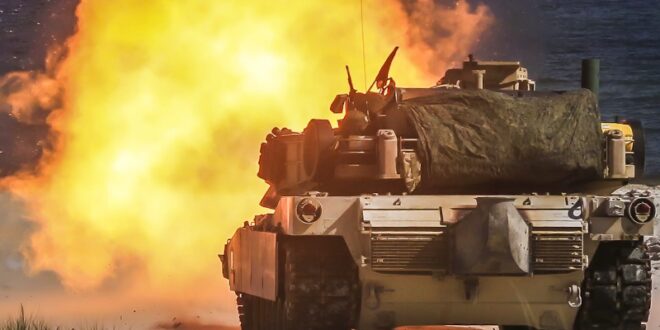Ukraine’s Western allies who can deliver battle tanks to Ukraine should do so right away, German Chancellor Olaf Scholz said on Friday (17 February), cementing Berlin’s recent U-turn on the issue, but dampened Kyiv’s hopes for fighter jets or long-range missiles.
“We will continue to strike a balance between providing support for Ukraine and avoiding an unintended escalation,” Scholz said at the Munich Security Conference, speaking just after Ukraine’s President Volodymyr Zelenskyy opened the forum via video link from Kyiv.
“This means that everyone who can supply such battle tanks should actually do so now,” Scholz warned, adding he would be “intensively campaigning” for allies to move on the issue.
Berlin would facilitate this decision by providing logistics and stock replenishment and by training Ukrainian soldiers.
“For me, that is an example of the kind of leadership people can expect from Germany,” Scholz said.
His call was read by many observers as a cementing of Germany’s eventual U-turn and a veiled criticism of the discrepancy between the publicly made commitments by some Western countries in recent weeks and their actual implementation.
For weeks, Scholz had insisted that Berlin would not go it alone on the issue, underlining his country would not be the only one which was reluctant.
Amid mounting international pressure last month, and after weeks of delay Berlin finally took to decide on the step, the German government released the planned delivery of modern Leopard 2 tanks from army stocks to help Ukraine fend off invading Russian troops.
This came, however, only after Poland threatened to go ahead even without obtaining the required permission from Berlin for the German-made weaponry.
Berlin said it is still waiting on some European partners to follow up with their own pledges, despite being originally the country accused of delaying the delivery to Ukraine over concerns of potentially escalating the conflict.
“We can now say that Germany is the biggest supplier of weapons to Ukraine in continental Europe, and we will continue to be that,” Scholz said.
“It is wise to be prepared for a long war and it is wise to give Putin the message that we are ready to stay with Ukraine,” he said.
However, the German chancellor cautioned that any further qualitative steps in arms deliveries going beyond tanks would only happen in close coordination with allies.
‘No blueprint’ on Russia
“For the first time in our history, a nuclear power is waging an imperialist war of aggression here on European soil,” Scholz said, adding that there was “no blueprint” for dealing with a nuclear-armed, revisionist Russia.
Scholz also warned that the West should not “rush into things” and should “carefully weigh up all the consequences of our actions and closely coordinate all important steps with our alliance partners”.
“Because we’re dealing here with a war in our neighbourhood, in Europe — a dangerous war”, Scholz said, adding he was “pleased and grateful” that US “President Biden and many other allies see it exactly the same way as I do”.
Defence spending pledge
In Munich, Scholz also committed again to increasing German defence spending towards the current NATO target of 2% GDP.
“Germany will permanently increase its defence spending to 2% GDP,” he told the security gathering but did not comment on the discussion about raising this threshold above the two percent mark.
Germany’s Defence Minister Boris Pistorius said earlier this week he was in favour of raising NATO’s military spending target, as allies gathered in Brussels for talks on whether defence expenditures of 2% of GDP are sufficient with a war raging in Ukraine.
At their Wales summit in 2014, NATO leaders had agreed to move towards spending at least 2% of GDP on defence within a decade, as a reaction to what the alliance perceived as a severely deteriorated security situation in Europe, months after Russia’s annexation of Ukraine’s Crimea peninsula.
Almost ten years later, NATO defence ministers launched the discussion on how to adapt the spending target, with a decision expected at a NATO summit in Lithuania in July.
Several NATO allies, especially Eastern Europeans, are pushing for higher military spending, which some of them already fulfilled.
In 2022, Germany was expected to reach defence expenditures of almost 1.5%, while France was seen as coming close to meeting the 2%, according to NATO estimates published last June.
According to these figures, Britain and Poland are amongst those countries meeting the target but falling short of the U.S.’s defence spending which is seen at almost 3.5% of GDP.
 Eurasia Press & News
Eurasia Press & News




